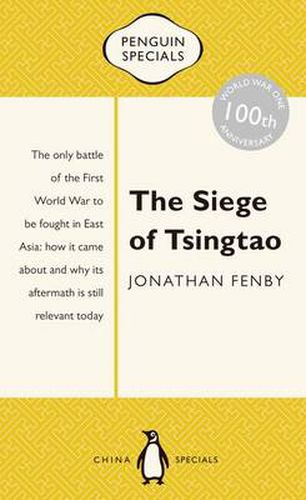Readings Newsletter
Become a Readings Member to make your shopping experience even easier.
Sign in or sign up for free!
You’re not far away from qualifying for FREE standard shipping within Australia
You’ve qualified for FREE standard shipping within Australia
The cart is loading…






In The Siege of Tsingtao, the first of the Penguin China Specials on the First World War, celebrated historian Jonathan Fenby examines the causes of the battle, the ulterior motives for it, and the path it helped set East Asia on for decades to come.
In 1914, Europe was not the only continent coming to terms with a new form of conflict. Through a mix of complex alliances and global ambition, the war had spread to northern China, where the German-held port of Tsingtao became a key battleground. To strike a blow at Kaiser Wilhelm’s naval forces, Britain and its ally Japan lay siege to the port during October and November.
In The Siege of Tsingtao, the first of the Penguin China Specials on the First World War, celebrated historian Jonathan Fenby examines the causes of the battle, the ulterior motives for it, and the path it helped set East Asia on for decades to come.
$9.00 standard shipping within Australia
FREE standard shipping within Australia for orders over $100.00
Express & International shipping calculated at checkout
In The Siege of Tsingtao, the first of the Penguin China Specials on the First World War, celebrated historian Jonathan Fenby examines the causes of the battle, the ulterior motives for it, and the path it helped set East Asia on for decades to come.
In 1914, Europe was not the only continent coming to terms with a new form of conflict. Through a mix of complex alliances and global ambition, the war had spread to northern China, where the German-held port of Tsingtao became a key battleground. To strike a blow at Kaiser Wilhelm’s naval forces, Britain and its ally Japan lay siege to the port during October and November.
In The Siege of Tsingtao, the first of the Penguin China Specials on the First World War, celebrated historian Jonathan Fenby examines the causes of the battle, the ulterior motives for it, and the path it helped set East Asia on for decades to come.